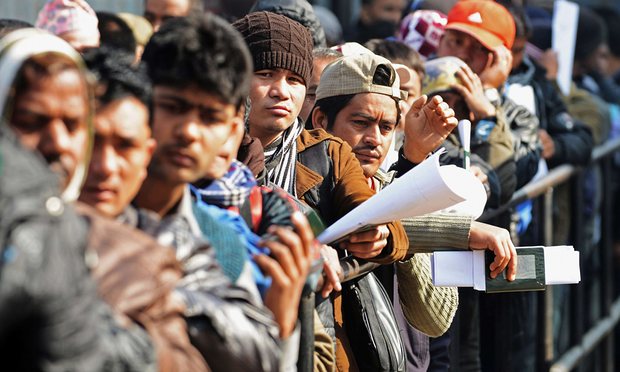Campaign
Recruitment to the Gulf: Challenges and Solutions
The exploitation low-income workers experience in the Gulf countries starts long before they step foot on foreign soil: deceptive recruitment practices and extortive fees trap workers in the unfair working conditions they may face after arrival – including unpaid wages and hazardous or isolating work environments.
The process by which workers are hired from key countries of origin reveals the rampant corruption within the recruitment industry, including the collusion of employers and government officials.

$400-1800
What migrants in Bangladesh, India, Nepal, the Philippines, and Sri Lanka pay in illegal fees.

Years
It can take workers months to years to pay back a recruitment fee, with interest, to an employer.

Human Trafficking
There has been little or no effort in streamlining recruitment agents in origin countries.


Migrant worker recruitment to the Gulf
The Problem
Excessive Recruitment Fees, False Promises and Bonded Labor
Prospective Gulf migrants do not always have complete information about job opportunities in the Gulf, and employers do not always know how to recruit workers in distant countries. Recruitment agencies therefore are a crucial link between these two parties. If industry best practices are maintained, agencies are in a position to ensure the best outcomes for both parties.
Recruitment Fee Extortion
Recruitment agencies solicit fees from workers for various purposes including medical tests, a processing fee, document checks, pre-departure orientation, flight tickets, insurance and housing costs prior to departure. While many countries limit how much workers can be charged ($328 in India or until recently $716 in Nepal), the reality is that migrants pay far higher fees.
Governments in origin countries seek to protect their citizens from paying exorbitant fees to secure a job, and to prevent exploitation. However, recruitment agents often transgress these laws by charging workers excess fees , under guise of medical tests, training fees, and “unanticipated charges.” Few migrants are actually aware that these rates are inflated and illegal. Additionally, workers who have begun the recruitment process are already heavily invested in migrating abroad. They would have borrowed money to fund their move, and have prepared their families and themselves emotionally for the transition. When a high financial and emotional price has already been paid, and when high salaries are promised in return, few are put off by agency fees.
When potential migrants reach the end of the recruitment process, they are often asked to deposit their passports to increase their retention rates and prevent them from changing their minds about going abroad. Many agencies also charge a heavy security deposit at the beginning of the recruitment process in order to ensure that approved candidates actually migrate. Sometimes, employers and recruitment agencies collude to deduct the wages from the worker each month until the recruitment charges are covered, at interest. If a worker is unable to pay the high recruitment fee upfront, they sign a document authorizing the employer to deduct a percentage of his monthly salary with interest. The employer pays the agency the required fees, and the employer collects it from the worker. The migrant only receives his full salary upon the completion of payment of his recruitment fees.
With low salaries, and high recruitment fees it can take workers months to years to pay back a recruitment fee, with interest, to an employer. Thus, many workers find themselves in bonded labor-like conditions, without the option to leave their employer until they break even on the charges. Other migrants who have paid the fees by taking out a high interest loan, may also be forced to work in unfavorable conditions until they pay off their debts back home.
Stories of Origin
Recruitment or human trafficking?
In the villages, there is a savior and he is simply called ‘agent’. He takes on the garb of the bogeyman in global migration narratives. The corrupt recruitment agent preying on gullible citizens and packing them off to hostile shores.
The truth lies between the two guises. There has been little or no effort in streamlining recruitment agents in Nepal. Word on the streets is that the owners of the agencies are politically well-connected.
Countries of destination too often shirk their responsibility in curtailing trafficking. As far as they are concerned it’s a problem of and limited to sending countries. Read more.
Recruited under duress
In an increasingly unfavourable migration environment, families in rural Indonesia have to be lured into sending their young women to the Middle East. Thousands of unregistered sub-agents scout villages for vulnerable and willing families. These sub-agents or field officers work under the radar, while chalos are registered with the government.
Following interviews with families and returning migrants, we stop for tea at the home of Dadang Muchtar, the chairperson of Karawang Migrant Workers’ Solidarity Center. He has gathered a group of ‘field officers’ (sub agents), returning migrants (including Sadiya), and families of migrants. His home is in the Paserkaliki village in the Karawang district. Read more.
Recommended action
Recommendations for Government
Provide easily accessible resources, including public rating systems of recruitment agencies, to allow employers to make informed and ethical decisions.
Widely circulate and enforce existing recruitment recruitment regulations. Develop best practices guidelines to nurture ethical recruitment agencies.
Collaborate closely with countries of origin to ensure safe migration practices between countries in both private and Government to Government recruitment.
Work with migrants and civil society to develop codes of conduct that delimit the principles of fairness and respect for worker rights.

![Image relating to [Stories of Origin] In the land of friends and uncles, everyone is an agent](https://www.migrant-rights.org/wp-content/uploads/2017/07/fullsizeoutput_1701-310x200.jpeg)


